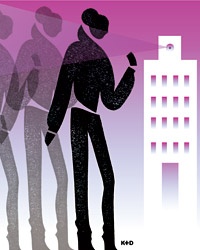 Kuntzel & Deygas Subliminal scents
Kuntzel & Deygas Subliminal scents
The Park Hyatt Washington, D.C., recently emerged from a $24 million makeover with more than just sleek guest rooms—it also now has a custom fragrance by Parisian perfumer Blaise Mautin. Hotel staff pumps the warm, woodsy scent into the lobby using atomizers.
Hyatt’s hoteliers aren’t the only ones exploiting guests’ sense of smell. Many luxury properties have embraced signature fragrances; now, scents are being adopted by the chains. At Omni Hotels, hidden machines spray a lemongrass–green-tea scent into the lobby and a coconut fragrance, for a tropical effect, around the pool; this year the hotel group plans to offer scents in its meeting spaces—citrus for energy, supposedly; lavender and sandalwood to reduce stress. Westin Hotels & Resorts, meanwhile, is debuting a signature White Tea aroma in 127 lobbies around the world in an attempt to, among other things, "create an emotional attachment to the building and the brand," says senior vice president Sue Brush.
Although some travelers may feel uneasy about perfumers and marketers meddling with their senses, insiders such as Mark Peltier, whose company, AromaSys, scents most of the mega-resorts in Las Vegas, see fragrance as a logical step in an industry focused on designing the ideal guest environment. As for the prospect of subliminal manipulation, Peltier is sanguine: "If you hear music you like and it makes you tap your foot, do you feel manipulated?" Perhaps the real question is, What if you don’t like the music in the first place?